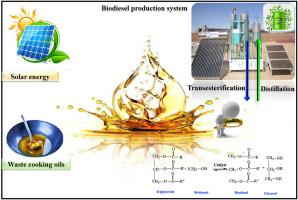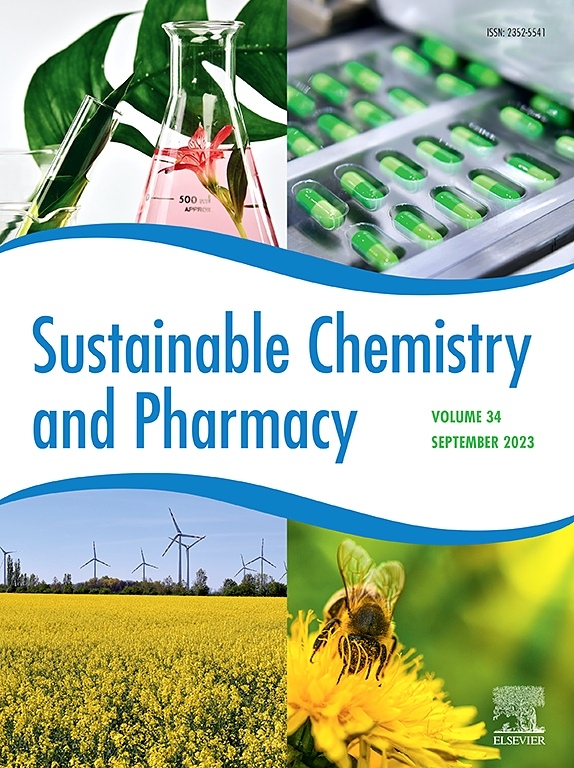Solar-powered biodiesel production from waste cooking oils: A sustainable waste valorization prototype for the Saharan environment
IF 5.8
2区 化学
Q2 CHEMISTRY, MULTIDISCIPLINARY
引用次数: 0
Abstract
This study presents the development of a solar-powered transesterification system for biodiesel production from waste cooking oil (WCO), using potassium hydroxide (KOH) as a homogeneous catalyst. The autonomous prototype integrates a solar water heater (up to 60 °C) and a 200 W photovoltaic (PV) generator to meet both thermal and electrical energy needs.
Prior to scaling up, laboratory experiments were conducted to determine the optimal reaction conditions. The best results were obtained at 60 °C, with a methanol-to-oil molar ratio of 6:1 and 1 wt% KOH. Under these conditions, the semi-pilot system achieved a biodiesel yield of 90 % per 50-L batch. GC–MS and FTIR analyses confirmed the effective conversion of WCO into fatty acid methyl esters (FAMEs). The resulting biodiesel met ASTM D6751 and EN 14214 standards, with a density of 0.8858 g/cm3, kinematic viscosity of 5.84 mm2/s at 40 °C, flash point of 188.2 °C, cetane index of 46.6, sulfur content of 0.0395 wt%, and an acid value of 0.35 mg KOH/g.
The system's energy demand, approximately 90 Wh per hour, is fully supplied by a 100 W PV panel coupled with a 100 Wh rechargeable battery, ensuring complete energy autonomy. These results underscore the potential of the proposed solar-integrated reactor as a scalable, eco-friendly, and cost-effective solution for decentralized biodiesel production in arid, solar-rich regions.

从废弃食用油中生产太阳能生物柴油:撒哈拉环境的可持续废物增值原型
本研究介绍了利用氢氧化钾(KOH)作为均相催化剂,利用废食用油(WCO)生产生物柴油的太阳能酯交换系统的开发。自动驾驶原型车集成了太阳能热水器(高达60°C)和200瓦的光伏(PV)发电机,以满足热能和电能需求。在放大之前,进行了实验室实验以确定最佳反应条件。在60℃、甲醇与油的摩尔比为6:1、KOH质量分数为1 wt%的条件下,获得了最佳效果。在这些条件下,半中试系统实现了每批50升生物柴油产量的90%。GC-MS和FTIR分析证实WCO有效转化为脂肪酸甲酯(FAMEs)。所得生物柴油符合ASTM D6751和EN 14214标准,密度为0.8858 g/cm3, 40℃时运动粘度5.84 mm2/s,闪点188.2℃,十六烷指数46.6,硫含量0.0395 wt%,酸值0.35 mg KOH/g。该系统的能源需求约为每小时90瓦时,完全由100瓦的光伏面板和100瓦时的可充电电池提供,确保了完全的能源自主。这些结果强调了所提出的太阳能集成反应器作为一种可扩展的、环保的、具有成本效益的解决方案,在干旱、太阳能丰富的地区分散生产生物柴油的潜力。
本文章由计算机程序翻译,如有差异,请以英文原文为准。
求助全文
约1分钟内获得全文
求助全文
来源期刊

Sustainable Chemistry and Pharmacy
Environmental Science-Pollution
CiteScore
8.20
自引率
6.70%
发文量
274
审稿时长
37 days
期刊介绍:
Sustainable Chemistry and Pharmacy publishes research that is related to chemistry, pharmacy and sustainability science in a forward oriented manner. It provides a unique forum for the publication of innovative research on the intersection and overlap of chemistry and pharmacy on the one hand and sustainability on the other hand. This includes contributions related to increasing sustainability of chemistry and pharmaceutical science and industries itself as well as their products in relation to the contribution of these to sustainability itself. As an interdisciplinary and transdisciplinary journal it addresses all sustainability related issues along the life cycle of chemical and pharmaceutical products form resource related topics until the end of life of products. This includes not only natural science based approaches and issues but also from humanities, social science and economics as far as they are dealing with sustainability related to chemistry and pharmacy. Sustainable Chemistry and Pharmacy aims at bridging between disciplines as well as developing and developed countries.
 求助内容:
求助内容: 应助结果提醒方式:
应助结果提醒方式:


